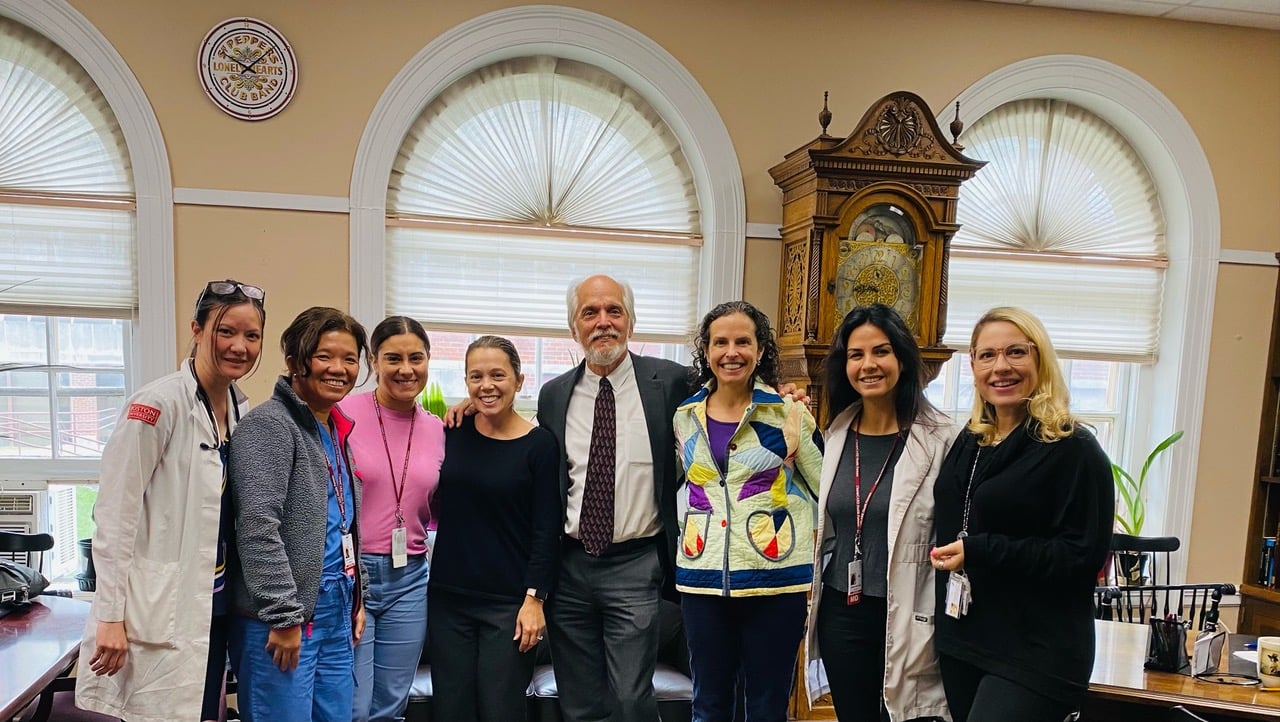Geriatric Medicine Fellowship Program
Mission:
The development of the Roger Williams Geriatric Medicine Fellowship is an effort with two strong academic institutions, Boston University and Brown University, to create an independent geriatric fellowship with shared didactics and clinical experience, with the overarching mission to train leaders who will continue to improve the care and well- being of the older adult. We wish to propel the field of geriatric medicine forward through research and education. We aim to bring comradery among our geriatric fellows and be an integral part of a developing network of geriatricians in Rhode Island who are all dedicated to the promotion of geriatric medicine through idea and model of care exchanges, research and quality improvement projects and providing the best evidence -based care to the growing older adult population.
History:
Roger Williams Medical Center is sited on a 30- acre campus near the Smith Hill neighborhood of Providence, Rhode Island’s capital city. The campus includes Roger Williams hospital, academic departments, research laboratories, the Elmhurst Extended Care Facility, the Cancer Center, and the Residents’ Practice offices. The hospital proper is a 220-bed general medical and surgical hospital which provides primary and tertiary care to all of Rhode Island and parts of Connecticut and Massachusetts.
Duration:
The training program, as specified by ACGME, is one clinically intensive year, which includes clinical, research, and didactic components.
Highlights of Fellowship program:
Goals and Objectives: The goal of the Roger Williams Geriatric Medicine Fellowship is to produce new leaders in geriatric medicine who will continue to improve the care and well- being of the older adult as well as propel the field of geriatric medicine forward through research and education. We aim to bring comradery among our geriatric fellows and be an integral part of a developing network of geriatricians in Rhode Island who are all dedicated to the promotion of geriatric medicine through idea and model of care exchanges, research and quality improvement projects, dedicated teaching of residents and medical students, and providing the best evidence -based care to the growing older adult population.
Graduates of the Roger Williams Geriatric Medicine Fellowship program will be able to demonstrate the ability to:
- Deliver expert clinical care to ill older persons in a continuum of care that includes acute hospital, ambulatory and institutional long-term care, geropsychiatry, hospice, home care and rehabilitation.
- Understand health policy and the health care delivery system relevant to older adults, including funding and long-term care.
- Teach and develop curriculum in all settings relevant to geriatric care, and to understand administrative issues in geriatrics program development.
- Effectively participate in aging research - in basic, clinical, or health services investigations.
Faculty:
- Dr Lidia Vognar
- Dr John Stoukides
- Dr Rebecca Brown
- Dr Aileen Soriano
- Dr Kristine Mortel
- Terry Gervais NP
- Giovanna Fischer NP
Our Fellows:
Joanna Abi Chebl:

Educational Program: Includes clinical, research, and didactic components
Clinical component: consist of the following rotations:
Longitudinal Care Rotation: 12 months
Longitudinal care rotation is a 12 month rotation that includes visiting nursing homes, where fellows will undergo a core training experience and gain knowledge, skills, and practice in the care of older patients admitted in the nursing home. Fellows will develop competence in the care of older long term care patients, including skilled nursing facility (SNF) and nursing facility (NF) levels of care.
Ambulatory Care Rotation: 12 months
During this rotation, fellows will develop competence in ambulatory care for a frail older patient population, living in different settings (independent senior housing, assisted living, day care, and home). Fellows will continue to attend ambulatory care clinic and subspecialty clinic during this rotation, once weekly, every Wednesday afternoon.
Home Based Care: 12 months
Fellows will be able to attend home visits during this rotation, while taking history and performing full physical exams, as well as diagnosing and treating patients while in the comfort of their own home.
Research Rotation: 12 months
Research rotation in the Geriatric Medicine Fellowship program constitutes a core training experience during which fellows will initiate a process of identifying a research question and research mentorship that can be carried out over the course of the entire year.
Inpatient Geriatric Hospitalist Rotation: 3 months
The geriatric hospitalist rotation constitutes a core training experience during which fellows gain knowledge, skills and practice in the care of acutely ill hospitalized older patients. During this rotation fellows will develop competence in managing older patients in the acute hospital setting under the supervision of the Geriatrician.
Geriatric Medicine Consult Service: 3 months
During this rotation, fellows will develop competence in consultation of elderly patients in acute hospital settings. They will acquire and develop the skills of performing comprehensive geriatric assessment in the inpatient setting.
Geriatric Psychiatry Inpatient Program: 3 months
This rotation allows fellows to provide inpatient psychiatric care for the elderly. Fellows evaluate and treat geriatric inpatients and have specific supervision with a geriatric psychiatry supervisor who has subspecialty boards in this area. Fellows will also participate in family meetings and gain skills for engaging patients and others in shared decision making.
Co Management Program: ortho co-management/ surg/onc co-management: 3 months
During this rotation fellows will develop competence in consultation/co-management of elderly patients in the acute hospital setting. They will be able to evaluate and perform comprehensive geriatric assessment on patients undergoing surgery, and evaluating them pre and post procedures. Fellows will also develop enhanced teaching skills with house staff in the inpatient setting.
Geriatric Palliative Care Consult Service/ Hospice Rotation (GPCC): 3 months
The hospice rotation constitutes a core training experience during which fellows learn about the management of the death and dying patient in the hospice setting in long-term care, at home, and in inpatient hospice units. Fellows will develop basic competence in the care of patients enrolled in a hospice program and develop enhanced skills in symptom management. Fellows will gain an appreciation for the psychological and social aspects of death and dying.
Electives: one month rotations
- Dementia Rotation
- Movement and Gait Rotation
- Endocrinology Rotation
- Urogynecology Rotation
- Wound Care Rotation
- Podiatry
- PACE Program
- Home Care Visiting Nurses Association
- Acute Rehabilitation
- Dermatology
- Pharmacy
- Community Paramedicine
Research Component:
A highly organized and supervised research program , compiling both didactics as well as project mentorship, led by our program director Dr. Lidia Vognar. Fellows are given the opportunity to take on research projects and QI projects, based on clinical research questions, yielding a poster and/or manuscript by the end of year 1 of fellowship.
Didactic component:
All fellows will attend common didactic lectures held weekly by Brown faculty and staff, where residents, fellows, and faculty members present fundamental lectures with topics pertaining to Geriatrics, Palliative Medicine, and Geri-psych.
Conference descriptions
1. Internal medicine noon conferences and case conferences:
Geriatric medicine fellows are assigned once a month or more to present a noon conference to the Internal Medicine residents under the supervision of one of the faculty members from 12 pm to 1 pm. Fellows are expected to present a review of relevant medical literature and highlight recent important articles that are published, pertaining to issues central to geriatrics. Fellows are also required to attend morning case conferences presented by Internal Medicine residents, every Monday morning from 10 am to 11 am. Residents and interns would spend less than 10 minutes presenting an interesting clinical case that features one primary question pertaining to a geriatric topic, followed by review of relevant medical literature. Open discussion by faculty, fellows, and residents.
2. Fundamentals of Geriatrics:
For the 12 months of the academic year, beginning in July, 15th, core clinical topics in geriatrics are presented in the 8-11 AM time period each week. Speakers are Brown faculty experts. Throughout the year, core geriatric psychiatry topics are presented from 10-11AM by field experts.
3. Journal Club:
One person (either attending, fellow, or Brown internal medicine residents) is assigned once a month to choose 1-2 recent and important geriatrics-relevant articles from peer-reviewed general medicine or geriatrics journals. The assigned individual describes and analyzes each article.
4. National conferences:
Geriatric fellows are required to attend one or more national conferences. They will also have the opportunity to present their work at national meetings.
Sites:
- Roger Williams Medical Center
- Our Lady of Fatima Hospital
- Rhode Island Hospital
- The Miriam Hospital
- Center for Women’s Surgery
- The Village at Waterman Lake
- Hope, Hospice and Palliative Care of Rhode Island
Applying for our Fellowship:
Preference will be given to applicants who have strong letters of reference; who have demonstrated excellence in residency training in Internal Medicine or Family Medicine; and whose personal statement demonstrates interest in and commitment to geriatrics.
The Roger Williams Geriatric Medicine Fellowship Program participates in the National Residency Matching Program. Applications are accepted through the ERAS system at www.aamc.org/eras. Completion of a U.S. internal medicine / family medicine residency program is required. To request additional information, please contact our Program Coordinator, Cindy Boutin at cboutin@chartercare.org or 401-456-2070 or Dr. Lidia Vognar, Program Director at lidia.vognar@chartercare.org
Fellow Benefits:
Benefits include four weeks of vacation per year, CME allowance, funding to attend one national meeting, health and dental insurance (individual or family), disability insurance, and life insurance.
